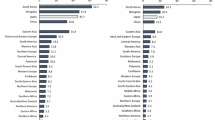Abstract:
A Mongolian gerbil model was used to clarify whether long-term colonization by Helicobacter pylori is an important risk factor for the development of gastric cancer. Fifty-nine gerbils (3 controls and 56 gerbils inoculated with H. pylori) were killed at various times (average, 23 months) more than 12 months after H. pylori inoculation. In the H. pylori-inoculated group, poorly differentiated adenocarcinoma was observed in the pylorus of 1 gerbil, and carcinoid was observed in the fundus of the stomach in 18 gerbils. No lesions were found in the stomachs of the 3 control gerbils. The results imply that long-term colonization by H. pylori is an important risk factor for the development of gastric adenocarcinoma and carcinoid.
Similar content being viewed by others
Author information
Authors and Affiliations
Additional information
Received: September 9, 1998 / Accepted: March 26, 1999
Rights and permissions
About this article
Cite this article
Hirayama, F., Takagi, S., Iwao, E. et al. Development of poorly differentiated adenocarcinoma and carcinoid due to long-term Helicobacter pylori colonization in Mongolian gerbils. J Gastroenterol 34, 450–454 (1999). https://doi.org/10.1007/s005350050295
Issue Date:
DOI: https://doi.org/10.1007/s005350050295




